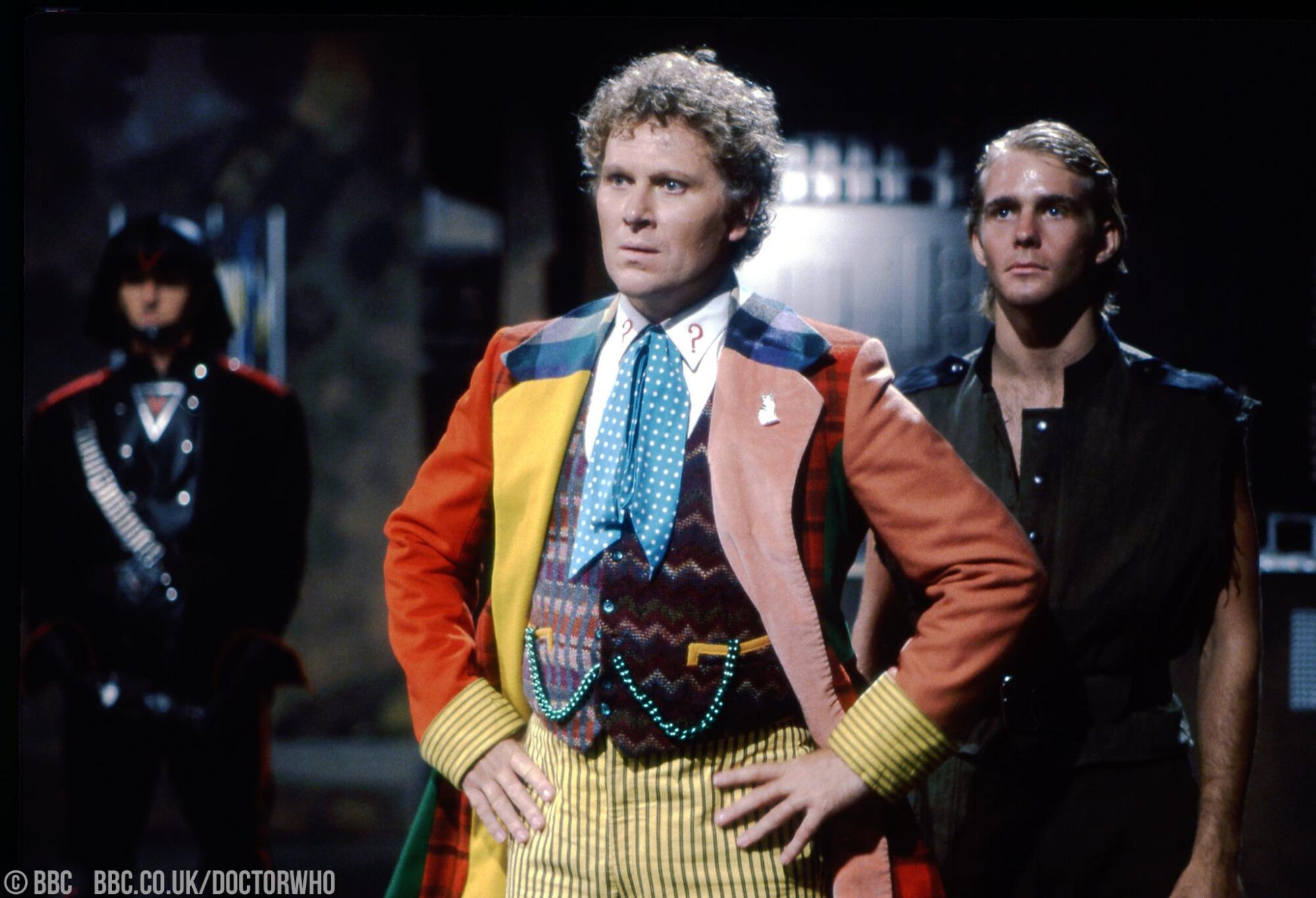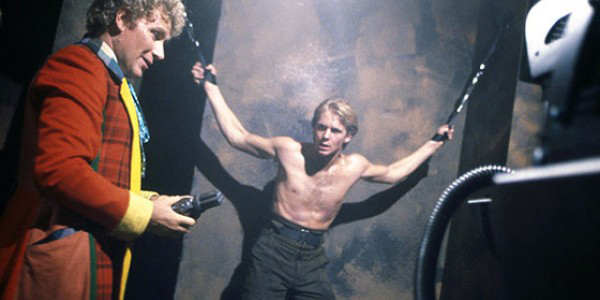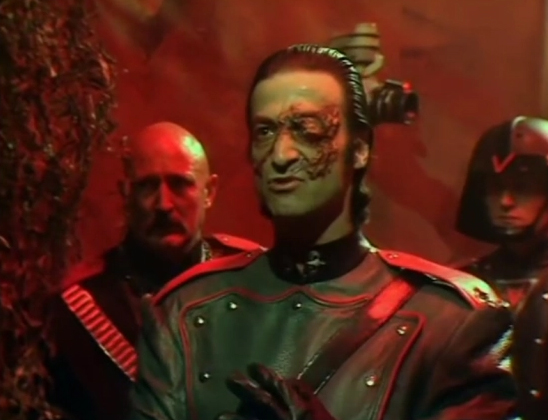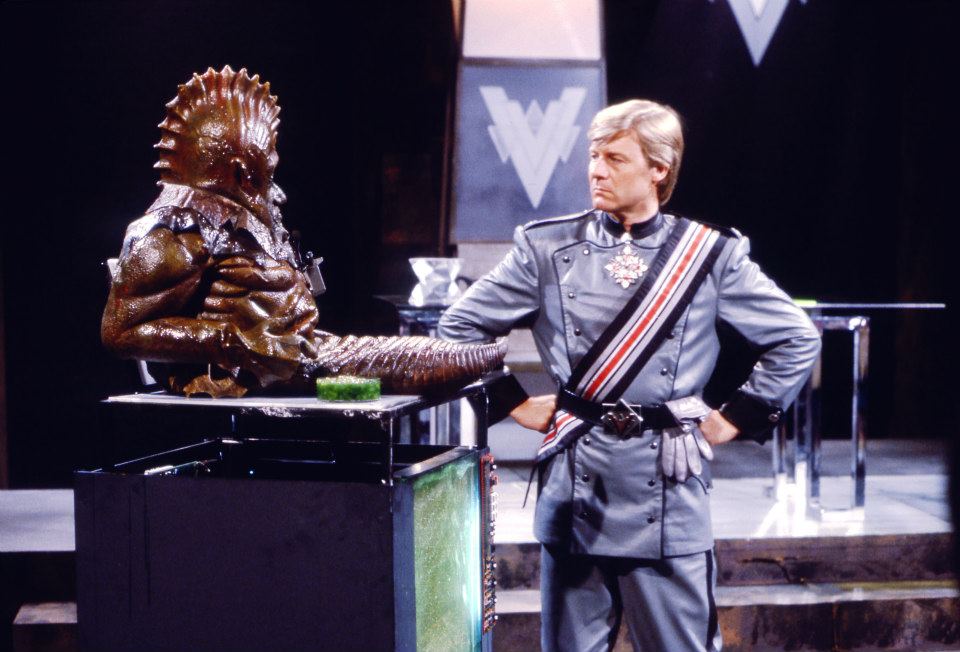The classic Doctor Who story ‘Vengeance on Varos’ came in Colin Baker’s first season, and pushed the boundaries of family entertainment. What was it about this 1985 story that made such an impact?

From the outset, the producer John Nathan-Turner was wary about ‘Vengeance on Varos.’ Its writer, Philip Martin, had been hired by the script editor Eric Saward, and in the mid 80s he was known as a somewhat provocative political writer. Nathan-Turner was concerned that Martin would use ‘Vengeance on Varos’ as a platform to push a certain agenda, much in the same way as the BBC’s Play for Today, which Martin had previously written for.
Martin and Saward did their best to assure Nathan-Turner that this wouldn’t be the case; Martin had his own take on Doctor Who and was keen to offer something of value.
And what he produced was unlike any Doctor Who story which had come before. It is hard to say whether ‘Vengeance on Varos’ was political as such, but it was certainly thought-provoking. It depicted a world in which people were mercilessly executed for challenging an oppressive, far-right regime, trapped within small, modular dwellings in a domed city nestled in a bleak, vacuous wasteland.

In this world there are food shortages, and the citizens of Varos work long hours for little reward. And whilst the executions are grizzly enough, what’s worse is that the population seem to enjoy them; the killings are beamed into their homes on a daily basis for their entertainment and delight. The government even sells tapes of the executions for repeat viewing. Certainly, Philip Martin was making a comment about violence as a form of recreational viewing. This was ironic, given how violent Doctor Who had become during Eric Saward’s time as script editor.
As such, ‘Vengeance on Varos’ does not make for comfortable viewing. It is not a cosy Saturday tea-time serial for all the family; it is dark, violent and bleak, and some of its scenes are truly shocking. One of the most famous moments is when the Doctor confronts two Varosian guards who are about to dissolve his body in acid. He tackles the pair, and as a result both of the guards fall into the pool and burn alive. Wryly the Doctor remarks, “Forgive me if I don’t join you.”
There is another harrowing scene in the second episode of ‘Vengeance on Varos’ where Peri and another character named Areta are subject to a form of mutilation under Varos’ transmogrification device, which slowly turns them into animals. And then there is the live execution (or attempted execution) of Varos’ president, played by Martin Jarvis, whose torture is transmitted into the citizens’ homes. And then there is the scene on the scaffold where the Doctor is almost hanged for rebelling against the Varosian regime.
And whilst these scenes are certainly unsettling, it’s important to note that none of the violence is glorified. ‘Vengeance on Varos’ doesn’t portray these images as wonderful or good – quite the opposite, in fact. The story shines a light on just how nasty these things are, and depicts a world that has become so used to watching people die that its population has become desensitised.
And this ties into Eric Saward‘s view on the depiction of violence in Doctor Who. In a subsequent DVD interview, he expressed his belief that – if violence is to be shown on television – then it should be shown to be real. He didn’t want to fudge or downplay its effect, and ‘Vengeance on Varos,’ for better or for worse, certainly doesn’t pull any punches. It doesn’t leave the viewer in any doubt as to how horrible life on Varos really is.
Today, ‘Vengeance on Varos’ is regarded as a true classic, and a high-point of the Colin Baker era. But what of the contemporary reaction?
Certainly, the story’s viewing figures were strong with a solid 7 million people tuning in for both parts. These figures did dip slightly in the weeks that followed, occasionally dropping to the 6.5 million mark, but overall the audience for Season 22 was consistent, and the series’ final story ‘Revelation of the Daleks‘ saw 7.7 million people tuning into its final episode – the second highest figure for the whole season. Clearly, people weren’t being driven away by the series’ tone.

However, ‘Vengeance on Varos’ did receive a number of complaints from the viewing public in the Radio Times, and some people expressed their distaste for the level of violence on the BBC’s Points of View programme. But at the same time, it’s worth remembering that Doctor Who was no stranger to such feedback. Indeed, the series had been receiving complaints about its content since the first episode of ‘The Dalek Invasion of Earth’ in 1964 – possibly even earlier. It was an action-packed science fiction show where good and evil locked horns on a weekly basis. There was always going to be a certain level of violence its stories.
This time, though, the complaints were used as a justification for pulling the show off the air. Speaking on The Colin Baker Years VHS tape, the actor said that the BBC deemed the show “too violent” and wanted to introduce more humour, and rested the show for 18 months. Season 22, it seemed, would be the last one for a while.

In reality (and this is now public knowledge) the show was strongly disliked by the upper echelons of BBC management, some of whom had a distaste for science fiction in general, and simply wanted to invest their money in different kinds of programmes. So, in truth, Doctor Who would have been pulled from the air even if ‘Vengeance on Varos’ had been a non-stop laughter fest.
All in all, the adventure is a provocative one, and raises some important questions about the depiction of violence and its consequences. And as mentioned previously, ‘Vengeance on Varos’ is now widely regarded as one of the best stories of the Colin Baker era, and has stood the test of time – even if its content remains the subject of lively debate.
How do you feel about ‘Vengeance on Varos’? And which is your favourite story from the Colin Baker era? Let us know in the comments below.









‘Vengeance on Varos’ was ahead of the four freeview chanel TV the UK had in 1984, and January 1985 when the story was originally broadcast on BBC-1.
Viewers being diverted and entertained by the eclectic experiences of others, and the hubris instilled within the viewer, is a perverted form of family screen/audio values.
‘Vengeance on Varos’ successfully pointed out the sickness of the medium, and how real-life TV often is not good for one.
Vengeance on Varos is superb on many levels.
Vengeance On Varos in parts a good story but during Colin Baker’s era it was shown to be violent, like in one scene Peri is with someone else than The Doctor now when the vehicle is stopped by a guard Peri does not answer his question and the guard slaps her across the face which to me is ungentlemanly conduct. So when Peri rejoins The Doctor I was surprised that she didn’t say anything, I agree when in a documentary Colin Baker reffered in saying there should have been more humour than violence because this was going out early evening when children will have been watching